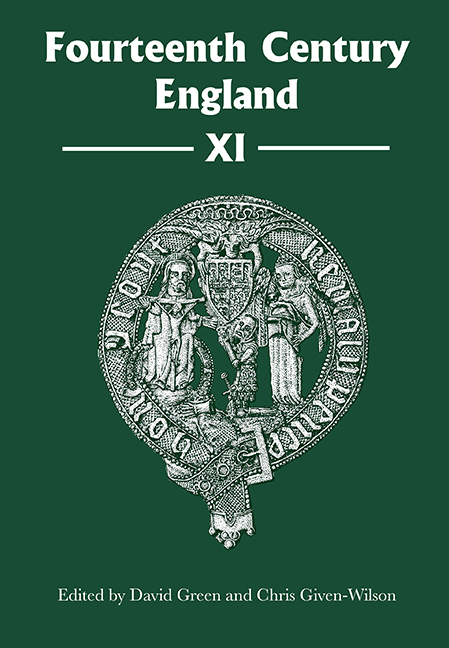Book contents
- Frontmatter
- Contents
- List of Illustrations
- List of Contributors
- Preface
- Abbreviations
- The Evolution of Edward I's ‘Historical’ Claim to Overlordship of Scotland, 1291–1301
- Prelates and Political Reform: The Bishops and the Ordinances of 1311
- Sir Robert de Wateville (d. 1330) of Essex and the Younger Despenser, 1322–6
- Memory, Genealogy and Nationality in Plantagenet England: The Plugenet and Walerand Estates, 1265–1368
- The ‘Apparitional’ Magna Carta in the Long Fourteenth Century
- Family, Loyalty and the Royal Household in Fourteenth-Century England
- The Revolution Stops Here? Leicestershire and the Rebellion of 1381
- FOURTEENTH CENTURY ENGLAND ISSN 1471–3020
Prelates and Political Reform: The Bishops and the Ordinances of 1311
Published online by Cambridge University Press: 14 September 2019
- Frontmatter
- Contents
- List of Illustrations
- List of Contributors
- Preface
- Abbreviations
- The Evolution of Edward I's ‘Historical’ Claim to Overlordship of Scotland, 1291–1301
- Prelates and Political Reform: The Bishops and the Ordinances of 1311
- Sir Robert de Wateville (d. 1330) of Essex and the Younger Despenser, 1322–6
- Memory, Genealogy and Nationality in Plantagenet England: The Plugenet and Walerand Estates, 1265–1368
- The ‘Apparitional’ Magna Carta in the Long Fourteenth Century
- Family, Loyalty and the Royal Household in Fourteenth-Century England
- The Revolution Stops Here? Leicestershire and the Rebellion of 1381
- FOURTEENTH CENTURY ENGLAND ISSN 1471–3020
Summary
The Ordinances of 1311 do not appear to have aroused the interest of contemporary chroniclers to the same extent that they have historians. Many chroniclers evidently found the Ordinances rather dull, not least the author of the Vita Edwardi Secundi, who remarked that he would not include a full account of them in his text, ‘because I would break the flow of the narrative and prove tedious to readers’. In consequence, their accounts of how, why and by whom the Ordinances were drafted are chiefly confined to the most general of outlines, snatches of gossip and colourful anecdote. Indeed, several chronicles do not even mention the Ordinances at all. Yet this has not prevented historians from ascribing them central significance in the politics of the early fourteenth century. While their reasons for doing so have changed, few scholars would dissent from Davies’ judgment of a century ago that ‘of all the experiments in the constitution made during the reign [of Edward II] the Ordinances of 1311 were the most important … all subsequent attempts to restrain the king were based upon them or drew a considerable amount of inspiration from them’. Accordingly, historians of the period have been left in a curious position: agreeing that the Ordinances are essential to understand-ing Edward II's reign, but with frustratingly little evidence to understand the composition of the Ordinances themselves. As Phillips put it, ‘little is known about how the Ordainers carried out their work or who, if anyone, was the major contributor to the Ordinances’.
Yet one aspect of the Ordinances’ creation about which historians have been confident is the absence of ecclesiastical influence behind them. Although scholars like Tout and Davies once considered the bishops to be leading players in the programme of 1310–11, this has been met with short shrift from at least the middle years of the twentieth century, when Edwards acknowledged that that ‘there is little evidence for bishops’ direct influence on the framing of the Ordinances’. This view has been endorsed by many of the leading recent historians of Edward II's reign, with Maddicott remarking that ‘the Ordinances … show few signs of clerical influence’; Prestwich claiming that there exist ‘scant signs of clerical involvement’; and Phillips arguing that ‘there is little in the Ordinances themselves to suggest that the clergy made any significant contribution to their formulation’.
- Type
- Chapter
- Information
- Fourteenth Century England XI , pp. 31 - 56Publisher: Boydell & BrewerPrint publication year: 2019



